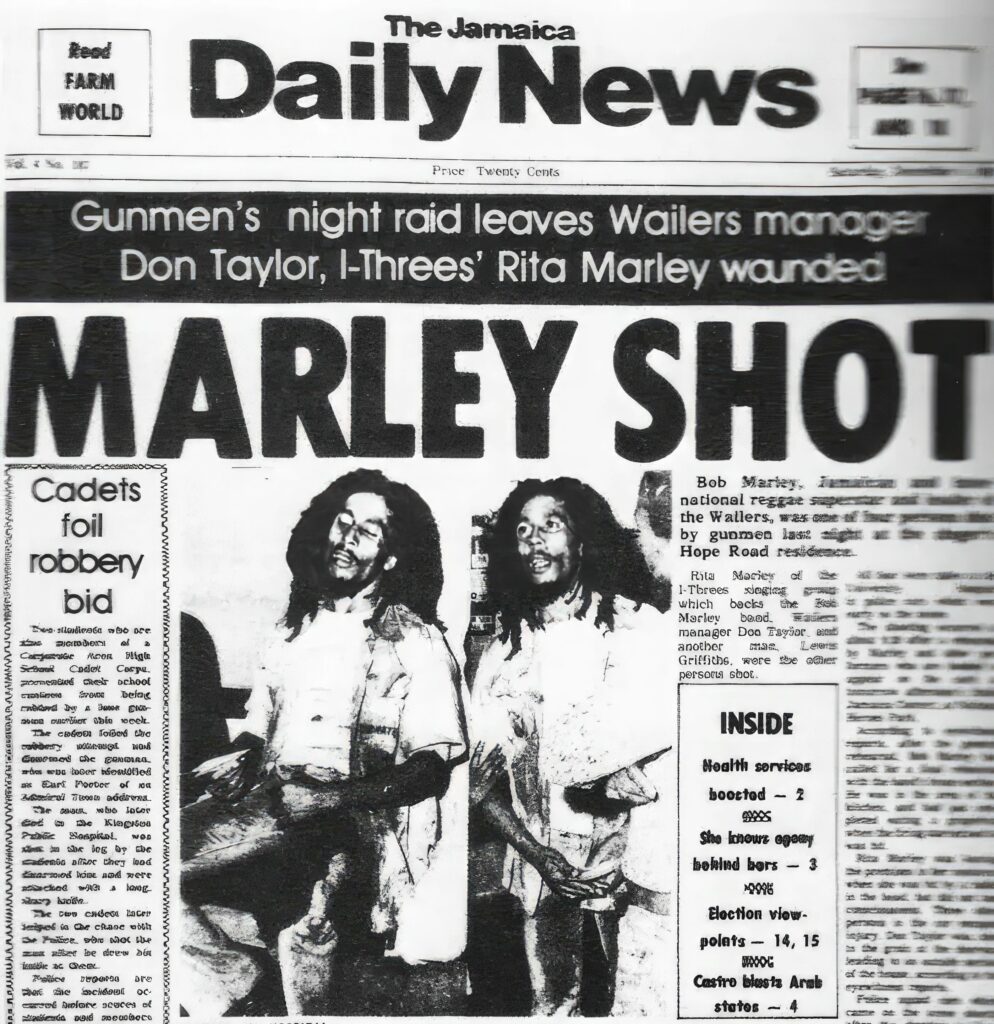The Night of Bob Marley’s Assassination Attempt

On December 3, 1976, an event transpired in Kingston, Jamaica, that could’ve altered the course of music history. Bob Marley, the legendary reggae musician, survived an assassination attempt just two days before he was to perform at the “Smile Jamaica” concert.
Let’s unpack that night, layer by layer.
Setting the Stage: Jamaica in the 1970s
Before we delve into the incident, it’s crucial to grasp the political unrest that was gripping Jamaica during the 1970s.
Elections were coming up and the atmosphere was electric, to say the least. Marley aimed to cool down the temperature with his “Smile Jamaica” concert.
Political Parties and the Role of Music
The two major political parties, the People’s National Party (PNP) and the Jamaican Labour Party (JLP), were both eager to get Marley on their side.
However, Bob Marley opted for a neutral stance. His music was about love and unity, and he wanted the concert to be a beacon of peace amid the storm.
The Night of December 3, 1976: A Timeline
Preparing for Rehearsal
Earlier in the day, Marley and his crew had been at Hope Road, his home and studio, preparing for the “Smile Jamaica” concert. This was more than a gig; it was a statement of unity aimed at a nation torn apart by political strife.
The Atmosphere
As the evening wore on, an aura of tension hung in the air, partly because Marley had been receiving threats for days. Even so, he decided not to involve the police and carried on with his rehearsal.
The Break-in
Around 8:30 p.m., two vehicles pulled up near Marley’s home. Men armed with guns broke through the rear entrance. Contrary to a typical home invasion, these intruders bypassed valuable items and went straight toward the area where the rehearsal was happening.
The Moments Before
Marley was with his wife, Rita, going over final details for the concert. His manager, Don Taylor, and friend Lewis Griffith were also present. Rita first saw the gunmen and screamed, providing a momentary alert.
The Attack
Gunfire erupted. Bullets sprayed the room, narrowly missing Marley, who instinctively moved towards a safer area. Don Taylor was hit five times but managed to scramble to safety. Rita was shot in the head but was, miraculously, not seriously injured due to the bullet only grazing her.
Amidst the chaos, Lewis Griffith managed to remain unscathed. Some speculate that his position in the room, hidden from immediate sight, saved him from being another casualty.
The Gunmen Flee
Almost as quickly as they entered, the gunmen retreated, leaving as many questions as bullets. Their identities remained a subject of speculation and rumor, with fingers pointing at political motivations and even at the CIA, although none of these theories were definitively proven.
Cultural and Global Impact
The Smile Jamaica Concert
Performing with wounds, Bob Marley took to the stage and played for 90 minutes. His defiance became an international headline, crystallizing his role as more than just a musician but as a symbol of resistance.
We might as well fire up the video from the “Smile Jamaica” concert, because it truly was a tale of survival that goes into the category of the most legendary music industry stories of all time.
Bob Marley – Live at Smile Jamaica, 1976 (Full Concert)
Beyond Music: Marley as a Cultural Icon
The assassination attempt further solidified Marley’s status as an icon of peace, love, and resistance against oppression. This event, though tragic, served to elevate his already significant role in social and political dialogues, both in Jamaica and internationally.
Legacy and Lessons
Marley’s life could have ended that night, but what transpired instead was an affirmation of his principles. He once said, “You never know how strong you are until being strong is your only choice.” The night of December 3, 1976, exemplified this in a profound way.
Conclusion
While the bullets failed to silence Bob Marley, the echoes of that night have lived on, shaping his legacy and continuing to inspire generations. This wasn’t just an attempt on a musician’s life; it was an attempt to stifle a movement. And that movement, epitomized by Bob Marley’s actions, could not be halted.